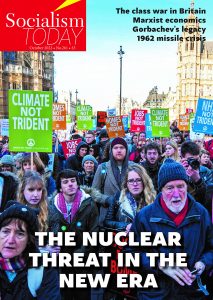
For over seventy years the major world powers have had the capacity to wipe out humanity in a nuclear conflagration. So what were the factors that held them back from nuclear war in the past? And do they still apply in the new period in world relations that has opened up with the Russian invasion of Ukraine? CLIVE HEEMSKERK contributes to the debate.
The tenth five-yearly review conference of the Parties to the Treaty on the Non-Proliferation of Nuclear Weapons (NPT), held in New York this August, opened to a sombre warning from the secretary general of the United Nations (UN), António Guterres.
Speaking of the most perilous situation since the cold war, he told the assembled representatives of the 191 UN member states who are signatories to the NPT that the world could be “just one miscalculation away from nuclear annihilation”.
“We have been extraordinarily lucky so far”, Guterres went on, but “luck is not a strategy. Nor is it a shield from geopolitical tensions boiling over into nuclear conflict”.
Such comments will deepen the understandable fears about the future of the planet, of young people in particular. To the threat of catastrophic climate change is added the risk of nuclear accidents – dramatized by the recent events around the Zaporizhzhia power plant in Ukraine – and premonitions of nuclear war.
Read more